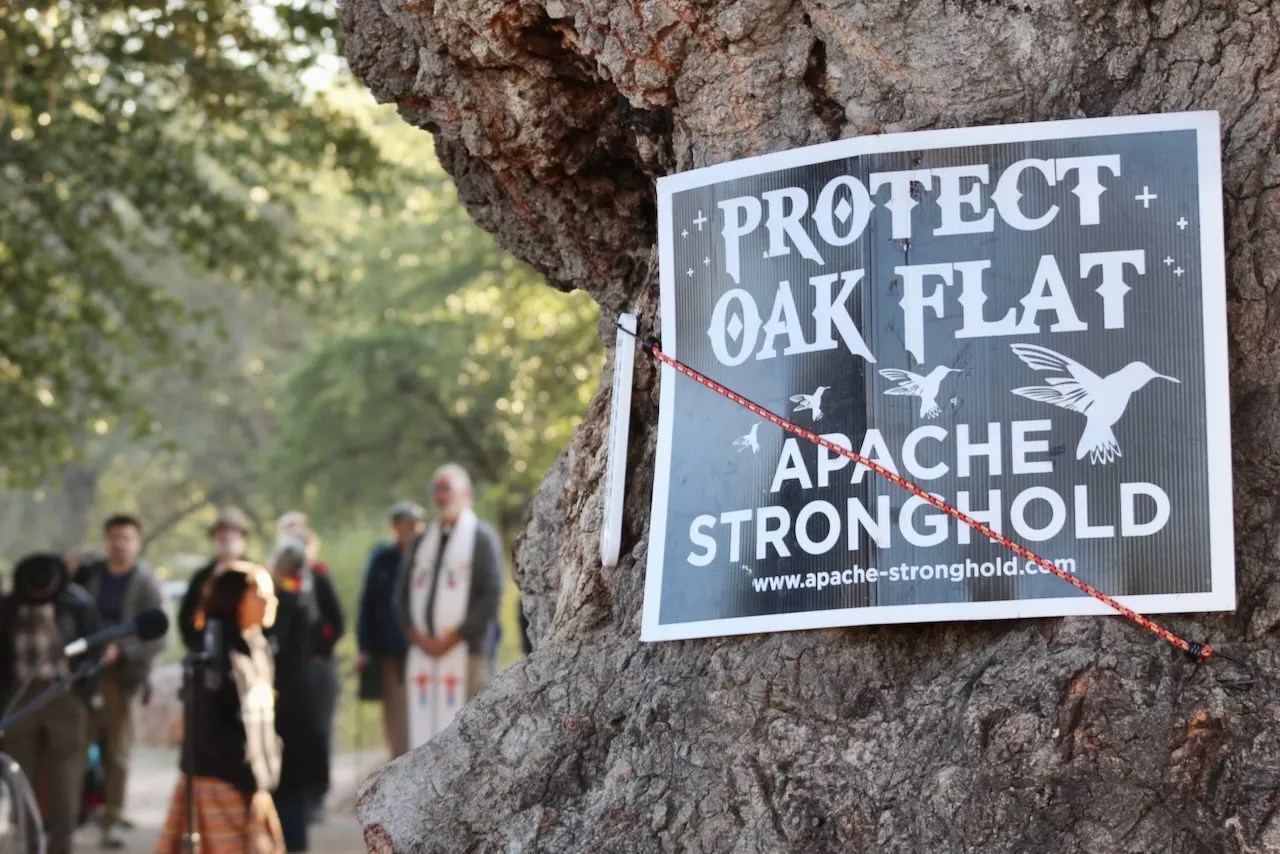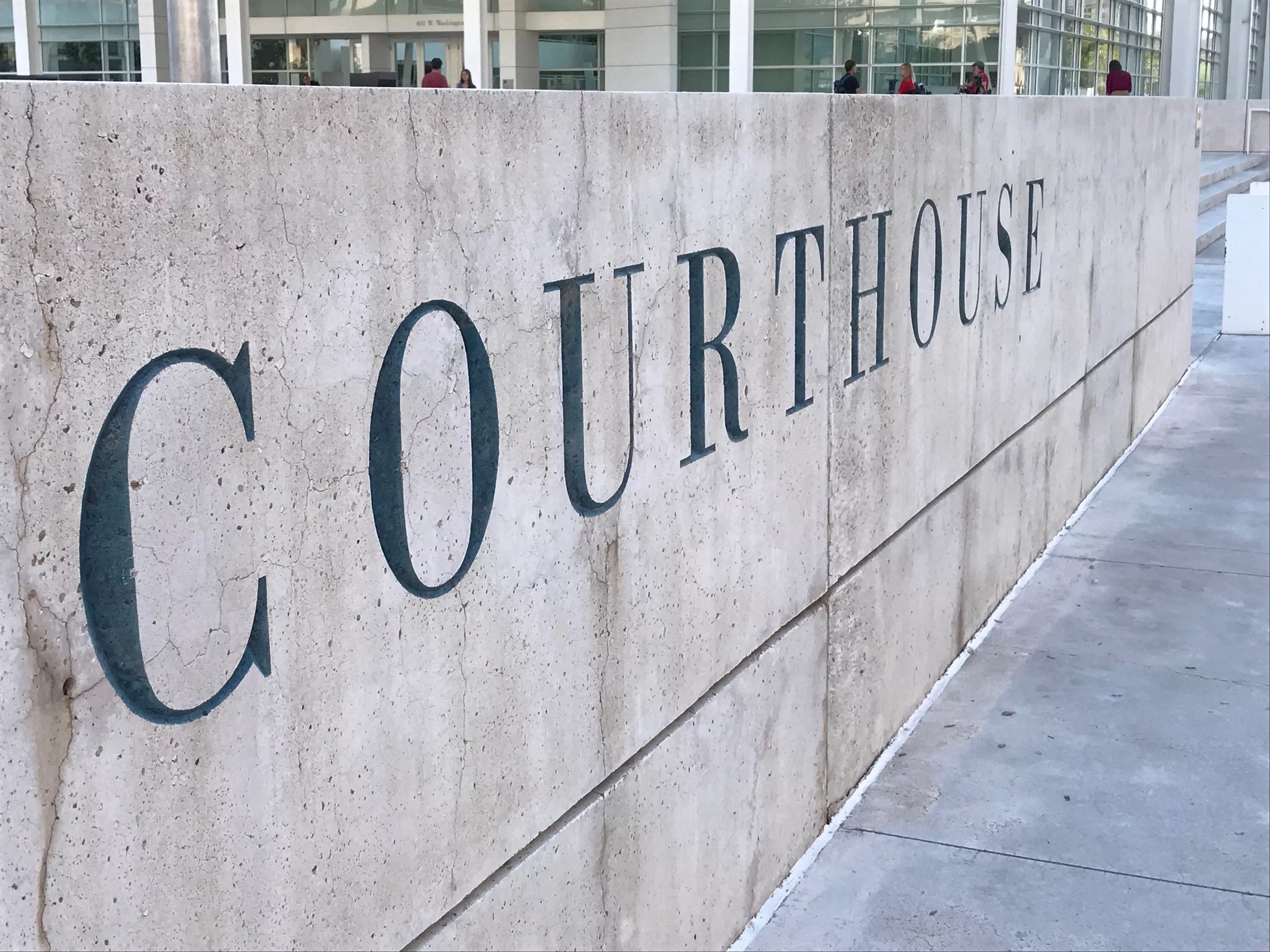
TJ L’Heureux

Audio By Carbonatix
This article originally appeared on Inside Climate News, a nonprofit, non-partisan news organization that covers climate, energy and the environment. Sign up for their newsletter here.
A federal judge ruled Monday that the U.S. Forest Service cannot transfer land containing Oak Flat, a site sacred to the Western Apache, to a copper mining company until two cases against the project are settled after the Forest Service publishes its final environmental review for the project. The ruling resurrects the legal efforts by the tribe and environmental groups to stop the proposed mine.
The legal battle over Oak Flat, known in Apache as Chi’chil BiÅ‚dagoteel, has been one of the most high-profile mining cases in the country over the past decade. Last month, the Supreme Court declined to hear Apache Stronghold v. United States, a religious freedom case brought by an Indigenous nonprofit organization that opposes the mine proposed for the area, which would destroy the sacred site, after the Trump administration signaled it would move ahead with approving the project before the court had ruled. But two more lawsuits against the project are continuing through federal courts in an attempt to prevent the federal government from transferring the land to Resolution Copper.
In separate lawsuits, the San Carlos Apache Tribe and a coalition of environmental groups sought a preliminary injunction to stall a land swap between the Forest Service and Resolution Copper.
The tribe argues that the land transfer violates the First Amendment rights guaranteed to them under a treaty with the federal government, and that the project violates the country’s national environmental and historic preservation laws.
The case by the conservation groups argues that the approval process violates the country’s environmental laws by failing to take a “hard look” at the project’s cumulative impacts.
“The bill that authorized the land exchange is not in the best interest of the American people, Arizona or the San Carlos Apache Tribe,” San Carlos Apache Tribe Chairman Terry Rambler said in a statement. “We have filed this lawsuit because of our concerns of the mine’s massive use of groundwater, which will be devastating for both Arizona and eventually the Tribe. We are also deeply concerned about the (impact the) environmental destruction and the obliteration of Oak Flat will have on Apache culture and religion.”
U.S. District Court Judge Dominic W. Lanza in Arizona heard arguments Friday in the two separate but similar cases filed against the Forest Service. Lanza denied the groups’ request for a preliminary injunction before the Forest Service made its final decision, stating that it was premature. But he did enjoin the Forest Service from transferring the land earlier than 60 days after releasing its final environmental impact statement. He set a timeline to rule on the cases before that point.
“It is unfortunate that the result of this order will be to force the parties to engage in another stressful, abbreviated round of briefing and litigation activity once the new (final environmental impact statement) is issued,” Lanza wrote in his order. “Nevertheless … it is simply premature to entertain any request for preliminary injunctive relief now” before the Forest Service publishes its final review of the project.
The Forest Service expects to publish the final environmental impact statement for the mine and land transfer by June 20. Sixty days after that, the land must be transferred to Resolution Copper as mandated by Congress.
The situation is unique and creates a compressed timeline for the case, Lanza said Friday during the court hearing, but it is what Congress mandated.
The Trump administration earlier this year signaled it planned to approve the project on Oak Flat, following President Donald Trump signing an executive order to streamline the permitting of mines across the country and make mineral extraction the top use of public lands that hold minerals in high demand.
“We are grateful that Judge Lanza has provided us an opportunity to be heard,” Rambler said. “The two-month window provides the Tribe an opportunity to file an amended lawsuit challenging the legality of the pending environmental report and request an injunction to stop the land exchange until the merits of our case are settled.”
The U.S. Department of Justice, representing the Forest Service, declined to comment. Anna Kelly, a spokesperson for the White House, said the Trump administration is “following through on his promise to ‘Drill, Baby, Drill’ and restore American energy dominance.”
Vicky Peacey, president and general manager of Resolution Copper, said in a statement that the ruling “is consistent with prior decisions about this project at every level, including the Supreme Court’s recent decision to deny further review in Apache Stronghold v. United States.”
“The order simply gives the parties time to review the FEIS within the timeframe Congress directed for the land exchange,” she said. “We are confident the project satisfies all applicable legal requirements.”

The Oak Flat area would be destroyed by Resolution Copper’s proposed mine near Superior.
Ray Stern
A years-long legal fight
Western Apache have gathered at Oak Flat since time immemorial for sacred ceremonies that cannot be held anywhere else, as tribal beliefs are inextricably tied to the land. The tribe believes the landscape located outside present-day Superior, Arizona, is a direct corridor to the creator, where Gaan – called spirit dancers in English, and akin to angels – reside.
But beneath Oak Flat lies one of the world’s largest untapped copper deposits. Resolution Copper, a subsidiary of two of the biggest mining companies in the world, Rio Tinto and BHP, has worked for decades to gain access to the location, where it would utilize what’s called “block cave mining.”
The method, used to access low-grade ore, requires undermining the surface of the land so it collapses under its own weight to reveal the copper. At some point, the proposed mine would create an open pit 1.8 miles wide and 1,000 feet deep, big enough to hold the Eiffel Tower and nearly as large as the local town, according to environmental review documents for the project.
Since the 1950s, Oak Flat has been under the jurisdiction of the Forest Service and listed in the National Register of Historic Places. Legislators for years pushed to have the land made available for mining via a land transfer in which a company typically offers up environmentally important land it owns in exchange for lands better suited for extraction but unavailable for development.
Each attempt failed until 2014, when the late Arizona Sen. John McCain and former Arizona Sen. Jeff Flake attached a last-minute rider to that year’s defense bill that required Oak Flat to be transferred to Resolution Copper.
The federal government’s initial environmental impact statement for Resolution Copper’s mine concluded that the project will destroy sacred oak groves, sacred springs and burial sites, resulting in what “would be an indescribable hardship to those peoples.”
It would also use as much water each year as the city of Tempe, home to Arizona State University and 190,000 people. It would pull water from the same tapped-out aquifer the Phoenix metro area relies on, where Arizona has prohibited more extraction except for exempted uses like mines.
The proposed mine would also leave behind a 500-foot-tall pile of mine tailings filled with 1.5 billion tons of toxic waste that would have to be constantly maintained to prevent that contamination from spreading.

A federal judge heard arguments Friday about whether to prevent the transfer of Oak Flat to a mining company.
Lynn Trimble
A ‘tremendous relief’
Friday, during the oral arguments for the case, Angela Ellis, a trial attorney with the Department of Justice, said that when Congress passed legislation for the land exchange, it excluded the transfer from the National Environmental Policy Act. No matter what the final environmental impact statement looks like, a court ruling cannot stop the land transfer, she said, adding that only other aspects for the project, like the mine plan itself, could be litigated and ruled on.
Roger Flynn, director and managing attorney at the Western Mining Action Project, which is representing the environmental groups, disagreed, arguing that when Congress ordered the land transfer, it was contingent on the action meeting the law. He added that once the land is transferred to Resolution Copper, the environmental groups, the tribe and the courts will have little ability to stop the project.
Despite not being granted their preliminary injunctions, the plaintiffs celebrated the ruling, which will prevent the land transfer from immediately happening and sets the stage for continued high-stakes litigation.
“It’s a tremendous relief that the court will prevent this terrible land exchange from taking place until we have the opportunity to review the Forest Service’s analysis and seek a more extended injunction,” said Marc Fink, the director of the Public Lands Law Center at the Center for Biological Diversity, one of the environmental groups suing the government over the project. “The Trump administration has been rushing to sell out our public lands and destroy sacred sites and the environment. We look forward to having our day in court to defend Oak Flat based on a full record.”